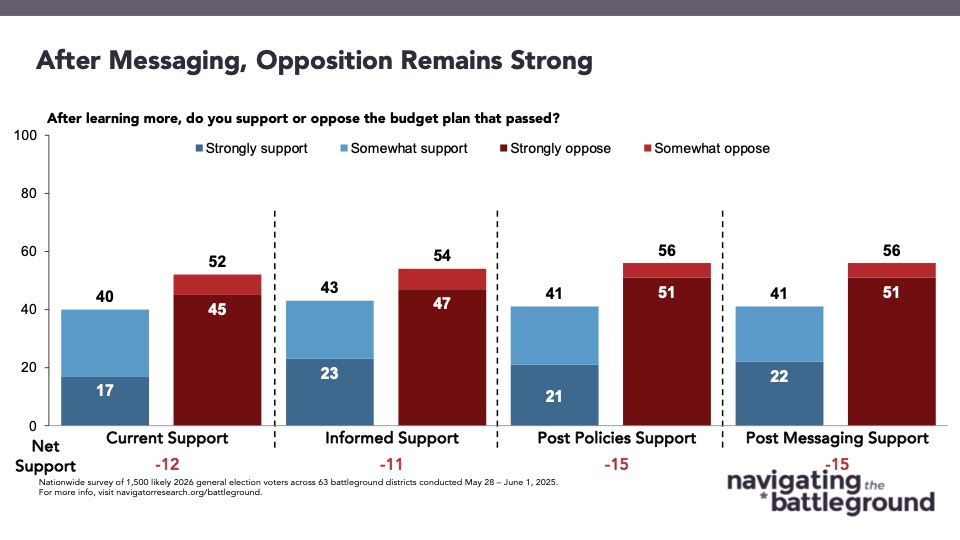Poll: House Republicans’ Budget Bill
This Navigator Research report covers the perceptions of the budget bill recently passed by House Republicans, including views of specific proposals and the most concerning aspects of the plan.
Following the passage of House Republicans’ budget plan, initial reactions of battleground constituents are negative and grow more sour as they learn more. A majority of Americans living in House battleground districts say they oppose the budget plan (net -12; 40 percent support – 52 percent oppose), including independents by 17 points (33 percent support – 50 percent oppose). This comes as a whopping 79 percent of battleground constituents have heard at least some about the budget plan that Republicans in Congress have passed.
There is a difference in intensity around the budget plan: of the 40 percent who support the plan, just 17 percent strongly support it. Among the 52 percent who oppose the plan, 45 percent strongly oppose it.
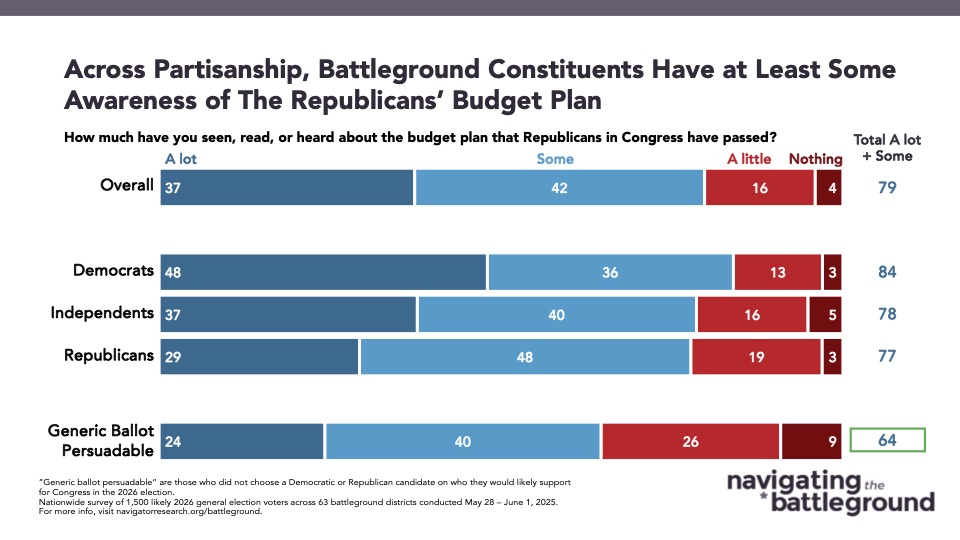
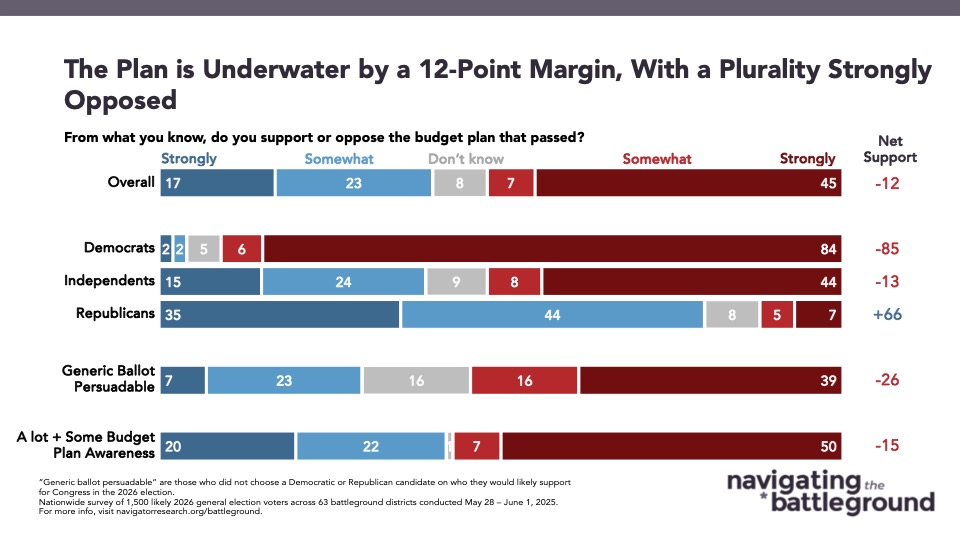
Half of Americans living in the battleground outright assume the budget plan will “include things that would be bad for people like me and my family” (50 percent), rather than things that are good for them (41 percent), including a plurality of independents.
- Pluralities also believe the plan will increase their household taxes and costs, rather than decrease their prices and costs.
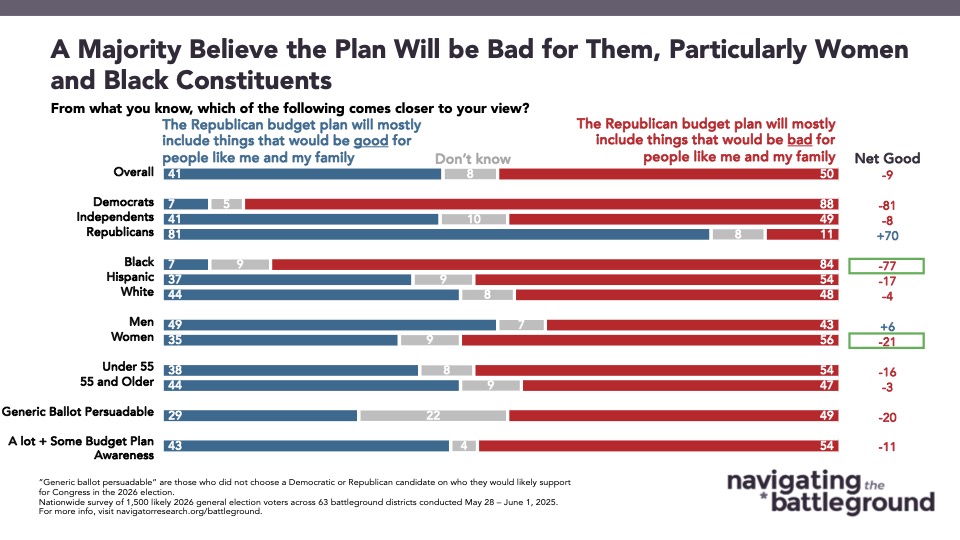
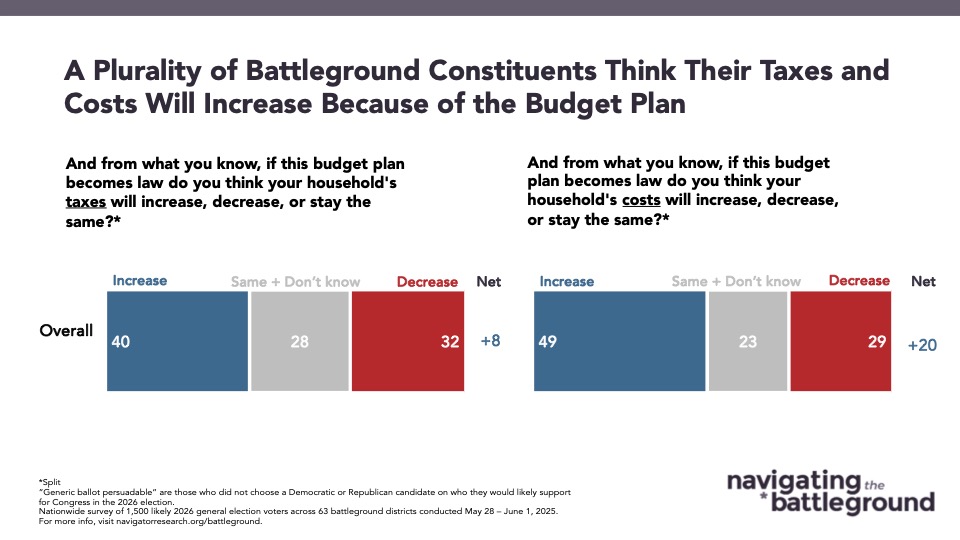
Opposition remains strong as battleground constituents learn more about what is in the plan. We showed respondents statements from supporters and opponents:
Supporters: This plan will get the country and the economy back on track by cutting taxes and cutting spending to get the country’s finances in order which will bring down inflation. This budget will increase our energy independence to lower energy costs, eliminate the tax on tips, and provide the largest investment in our border security in a generation. This budget plan roots out government waste, protects Medicaid for those who really need it, increases the childcare tax credit for working families, and will help American families get ahead after four years of struggling.
Opponents: This plan will give massive tax cuts to the ultra-wealthy while raising costs and taxes for working American families and adding $3.8 trillion to the deficit. To fund the largest billionaire tax cut in history, Republicans in Congress passed the largest cut to Medicaid in history – putting at risk health care for people in nursing homes and kids who are counting on it. They’re taking away tax credits, forcing up the insurance premiums for working people, and could take away health care from 13.7 million Americans.
Following this information, a majority of battleground constituents remain opposed to the plan (54 percent oppose), growing to 56 percent in opposition after learning more about the specific policies within the budget plan.
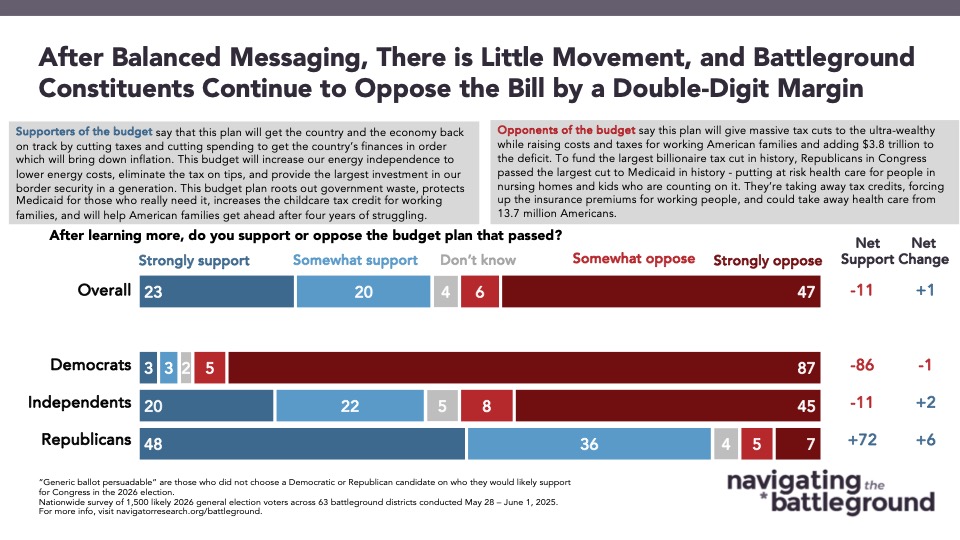
The Specifics
The most strongly opposed policies in the budget plan are the tax breaks for the wealthiest Americans and cuts to programs Americans depend on:
- This budget bans Medicaid payments to health care providers that provide abortion services, even when the services they are providing are not abortion related (54 percent strongly oppose);
- This budget gives the largest billionaire tax cut in history, paid for by making devastating cuts to Medicaid (52 percent strongly oppose);
- According to independent auditors, this budget will add over $3 trillion to the national debt (51 percent strongly oppose);
- In this budget plan, the top 1% will get $64,700 more in tax breaks while the bottom 20% will get just $90 (50 percent strongly oppose);
- This budget makes the largest cuts to Medicaid in U.S. history, which independent auditors estimate will cause 7.6 million Americans to lose their health insurance, including veterans, seniors, children, pregnant women, and people with disabilities (50 percent strongly oppose);
- This budget raises health insurance costs by as much as $4,000 by ending tax credits for people and businesses who buy their health insurance on their own (50 percent strongly oppose); and,
- This budget cuts more than $500 billion from Medicare (50 percent strongly oppose).
Among these proposals, battleground constituents believe the cuts to Medicare and Medicaid and the tax breaks for the top 1% would have the biggest harmful impact on people like them and their families.
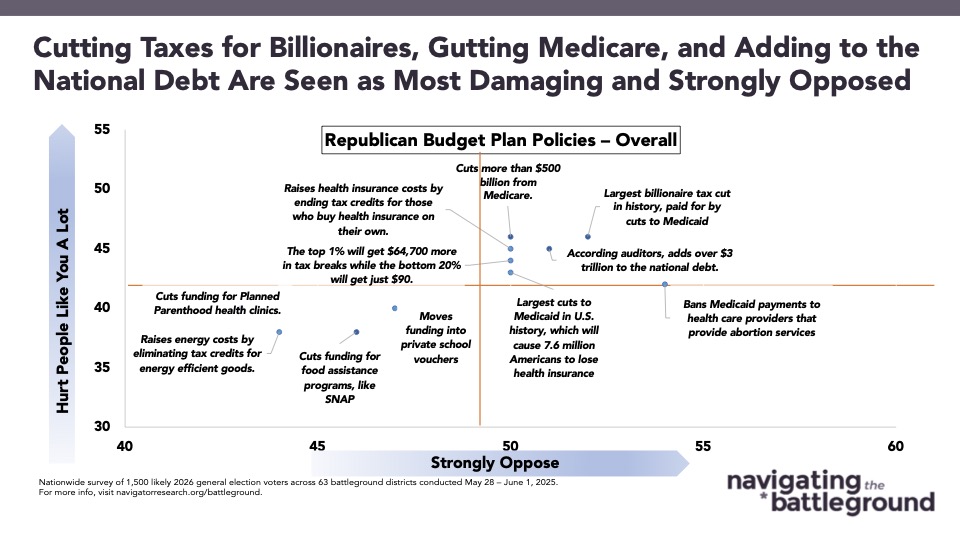
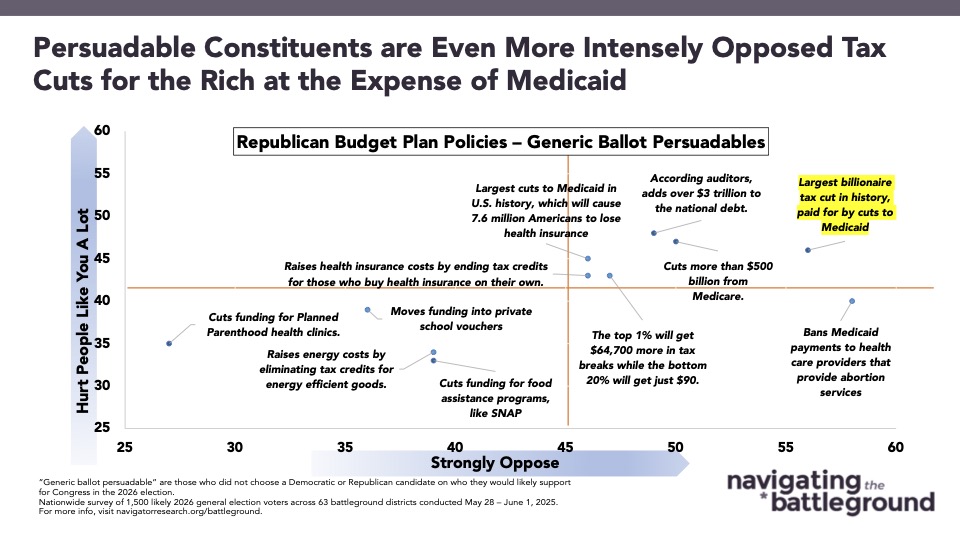
Messaging that Moves
The most convincing critiques of the Republican tax plan focus on the devastating cuts to programs and the disproportionate tax break for billionaires, at the expense of working people:
This budget plan makes devastating cuts to programs that working class families rely on, like Medicaid, while giving breaks to the wealthy and big corporations. Independent experts say 13.7 million Americans could lose their health care or be forced to pay thousands more a year and funding for nursing home care will (56 percent find this convincing, including 44 percent who find it very convincing);
This budget plan includes the largest tax break for billionaires in history, and to pay for it, they eliminated tax credits that help working and middle class families afford health insurance (54 percent find this convincing, including 43 percent who find it very convincing); and,
This budget plan will drive up costs for families who are already struggling to make ends meet. It will drive up out of pocket health care costs, and the tariffs on food and imports they have already imposed will make everything Americans buy more expensive (54 percent find this convincing, including 41 percent who find it very convincing).
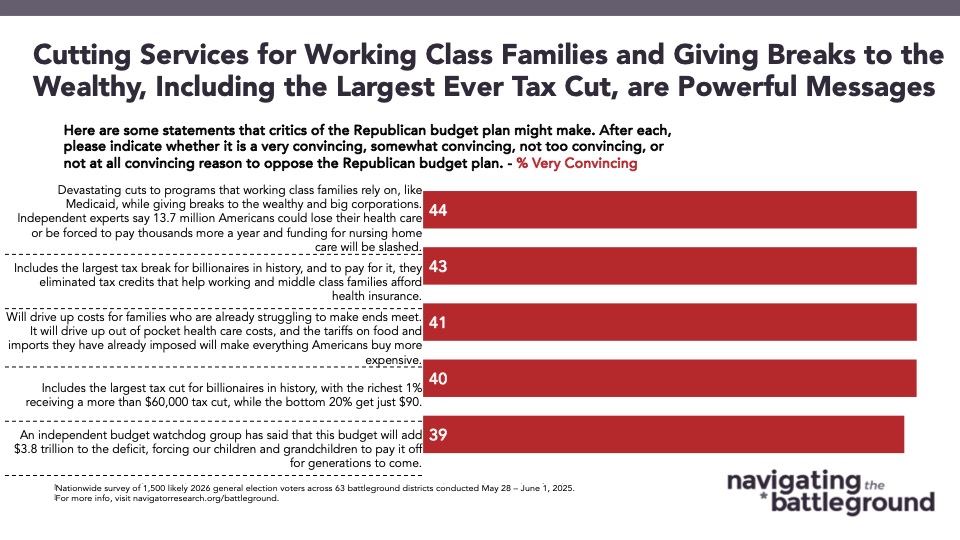
The Work Requirements Bait
When it comes to cuts to Medicaid, how you frame the argument on work requirements matters significantly. Battleground constituents narrowly oppose work requirements when it is framed as “a proposal to take away Medicaid health coverage from people who do not meet a requirement to work at least 20 hours per week” (46 percent support – 49 percent oppose), including 42 percent of independents. Support for work requirements is 18 points higher when framed as “a rule that requires people who are capable to work a minimum of 20 hours per week in order to receive Medicaid health coverage” (64 support – 31 percent oppose).
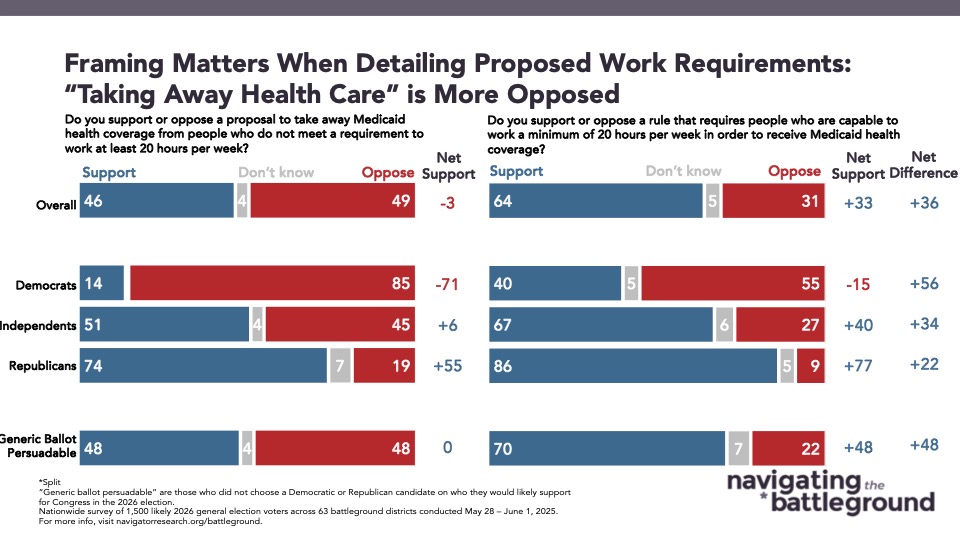
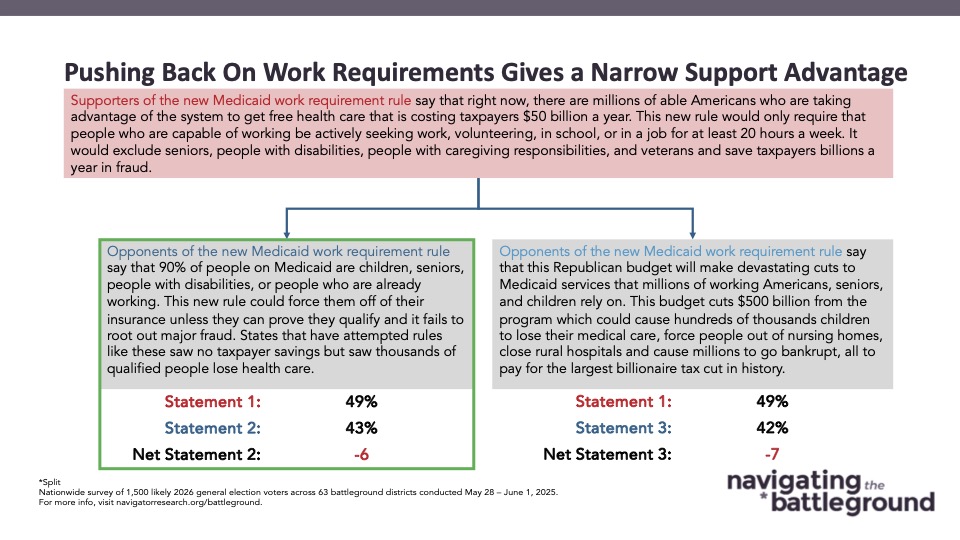
After learning more about the specifics within the budget plan, 56 percent of battleground constituents continue to oppose it, including a majority who strongly oppose it (51 percent). This is more than double the share who strongly support the plan (41 percent support, 22 percent strongly support).
Following the budget specifics, a majority of battleground constituents say that “Republicans in Congress are more focused on helping other people than me” (55 percent), including independents (53 percent) and those living in households with a total income less than $100,000 (58 percent).
